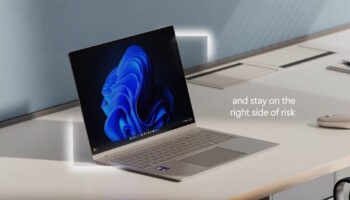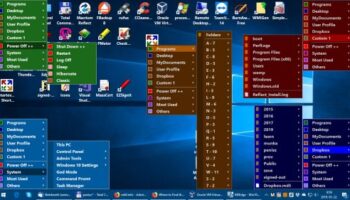'Mobile malware is the new frontier of cybercrime'

That's the stunning statement made by Robert Siciliano, a security and identity theft consultant, blogging for McAfee today. The post's title is nearly as provocative: "McAfee Reports Most Malware Ever in Early 2011".
Siciliano writes based on the McAfee Threats Report: First Quarter 2011, which released on June 1 and has gotten modest coverage among bloggers and journalists.
Apple tops US smartphone rankings

There is nothing that riles my ire like data taken or given without context (or out of it). That's the case with new smartphone data released today by ComScore. The chart above is more or less self-explanatory. Well, at first glance it is.
"During the three months ending in May 2011, 76.8 million people in the U.S. owned smartphones", according to a ComScore Data Mine blog post. "Among smartphone owners, Apple accounted for 26.6 percent of devices". Research in Motion ranks second.
RIP: Palm 1992-2011

It's been a little more than a year since HP acquired struggling smartphone pioneer Palm, and now the Palm name is history.
HP on Monday announced it is reorganizing its HP Palm brand into a new group called the webOS global business unit, led by Stephen DeWitt, who replaces former Palm CEO and webOS leader Jon Rubenstein.
Twitter passes one million registered apps
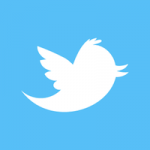
Microblogging service Twitter said Monday that more than one million applications have now been registered, representing the work of over 750,000 developers. This is a marked increase from last year, when just 150,000 registered apps existed.
With such an explosive growth rate, this means a new app is registered with Twitter every 1.5 seconds.
Smartphones and tablets are only good for unimportant tasks, says survey
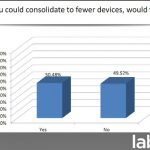
The graph I've embedded above comes from a survey conducted on behalf of virtualization software company Parallels, and it succinctly illustrates one of the main questions related to the value of mobile and embedded technology: When one machine duplicates the functionality of another, do you consolidate?
The survey, which polled a modest group of 210 individuals, shows a nearly perfect split between those who would consider consolidation and those who wouldn't (50.5% said they would, 49.5% said they would not.) It is a question of special value to a virtualization company like Parallels, and proof that device convergence is still a tough nut to crack. When one device gains the ability to do the job of another, users still aren't convinced they should drop the device that's been "replaced."
Microsoft sells 400 million licenses for Windows 7
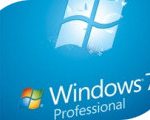
Windows 7 continues to charge ahead as a successful operating system release for Microsoft. CEO Steve Ballmer revealed in a Monday keynote at the annual Worldwide Partner Conference in Los Angeles that the number of licenses sold worldwide has now surpassed 400 million.
Microsoft's latest version of Windows already runs on a little over 27 percent of all worldwide computers, according to data from Net Applications. Even though Windows 7's share has nearly doubled in the past year, it still has not been able to unseat the market leading Windows XP, still running on over half (51 percent) of all PCs.
Google posts the best doodle in the world

Early this afternoon, I trucked over to the Google search page, saw the doodle above and wondered: "Who's birthday is it? Who is Google celebrating today?" Doodles are fairly common commemorating special days. It's my birthday. What a funny coincidence it seemed, but wasn't. The Google doodle is for me.
Have you seen a personalized doodle like this before for you? It's new to me, and I'm thinking it all has to do with Google+ and new user profiles associated with it. I've been logged into Google on other birthdays but never noticed the doodle in the past.
You can remove TDL4/ Popureb malware from Windows PCs

"Indestructible" rootkits, "fatal" trojans, "hellish" viruses -- malware has always been a great topic for generating scary headlines. There's generally no need to worry, though. Almost whatever the threat, if you can just wait for a while then a free (and often simpler) solution will turn up.
The latest variant of the Popureb Trojan, for instance, hides itself away in your Master Boot Record, and hooks a hard drive port driver in an attempt to protect itself from being overwritten. It's so deeply buried that Microsoft initially recommended reinstalling Windows if you were infected, but a few days later they changed its advice to point out that a little work with the Recovery console could get your PC back to normal. Or alternatively, a free Webroot tool can detect and remove the threat for you in just a couple of clicks.
Starting over with the Internet is cybersecurity Shangri-la

Many of the worst problems on the Internet are probably unsolvable, at least as a practical matter. One of the favorite models to imagine our way out of this ordeal is to start over with a new and more "secure" Internet. Sadly, this is an even less practical idea than fixing the one we have.
The latest to dare to imagine this dream is U.S. Cyber Command chief Gen. Keith Alexander who wants a ".secure" network for critical infrastructure: ".secure would require visitors to use certified credentials for entry and would do away with users' Fourth Amendment rights to privacy. Network operators in the financial sector, for example, would be authorized to scan account holders' traffic content for signs of trouble. The current Internet setup would remain intact for people who prefer to stay anonymous on the Web".
Still think iPad is the future of publishing? Philly papers offer cheap Android tablets to subscribers

The withering newspaper and magazine industries began to gravitate toward Apple's iPad as a possible anchor publishing outlet last year, but a pair of Philadelphia newspapers are taking a different approach and bundling cheap Android tablets with a subscription.
Last year, Conde Nast's Wired showed off an impressive iPad-optimized version of its magazine, and News Corp released The Daily, a subscription magazine designed from scratch for consumption on the iPad. These major ventures didn't simply re-format existent content for the iPad, but rather designed their content around the tablet itself.
Uh-oh, Kindle, Nook, the first Google e-reader is here

The first e-reader to be integrated with the Google eBooks platform will be the iriver Story HD, and it will be available across the United States on July 17, Google announced Monday.
Google eBooks launched last December and included a browser-based e-bookstore, and reader apps for Android and iOS as well as JavaScript-supportive Web browsers. Because Google utilized Adobe's e-book publishing platform, books purchased through Google's bookstore could be read on the long list of devices that support it.
Google+ is victim of its own success

I should have followed Vic Gundotra, Google senior vice president of engineering, sooner on G+. Otherwise I wouldn't have missed his post about yesterday's Google+ glitch. One of the servers supporting the service ran out of disk space! He apologies for the resulting "spam".
"For about 80 minutes we ran out of disk space on the service that keeps track of notifications", Gundotra writes. "Hence our system continued to try sending notifications. Over, and over again. Yikes. We didn't expect to hit these high thresholds so quickly, but we should have".
Cutting cable's cord isn't easy
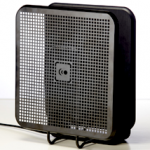
First in a series. I discovered a great way to waste a summer Saturday morning. Yesterday, I made the first steps to giving up cable -- OK, IPTV in my case -- and, whoa, it didn't go well. I planned to go completely cable-free, adopting over-the-air HD broadcasts and online streaming from Amazon, Hulu Plus and Netflix. But moving to TiVo and antenna started painfully.
More people are making the same move. Since 2008, 1 million US households cut cable's cord and switched to over-the-air broadcasts and online streaming, says Convergence Consultancy Group, which expects the number to reach 2 million by year's end. That's a small percentage of households, but it will double the number this year gained in the previous two.
I'm a Google geek now
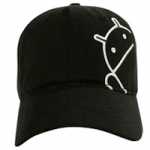
This weekend, I am embarking on a bold experiment, replacing another one started in April. I attempted to go Google-free and, as explained a few days ago, failed. What's that cliché? If you can't beat them, join them. So now I'm going all Google, or as nearly as humanly possible.
The goal is simple: Replace the majority of digital lifestyle products and services I now use with those provided by Google or enabled by them. In process, I'll be looking to answer a simple question: What is the Google lifestyle? Timing is impeccable. Google is undergoing a massive makeover that probably isn't coincidental to cofounder Larry Page becoming CEO (again). That lifestyle is changing, too.
You missed some great apps this week, particularly web browsers

Never fails to amaze us how much effort web browser development teams are investing to bring us the latest and best browser. Where's the end goal? You can understand Google pushing significant resources in to Chrome, as it's part of the new Chrome OS. But why are Opera and Firefox so keen to be seen to develop and release new versions of their browsers more quickly than ever?
This week has seen a plethora of new or updated web browsers from Mozilla and Opera. Earlier this week, Firefox 6 beta was launched to the general public. Firefox Aurora is now 7.0a2, whilst Firefox 8 moved in to the Nightly channel. And there are almost no differences between 7.0a2 and 8.0a1. On top of this, Opera 12 made it's very fist public bow in the form of a pre-alpha. Since when did any developer release an alpha, never mind a pre-alpha, to the general public? It's up there on the Opera website for anyone to download. You can test Opera 12 "Next" alongside the regular Opera 11.50, if you're keen to see the latest developments. Maxthon 3.1.3.1000 was also released this week, which is a browser based on the engine that powers Internet Explorer.
Most Commented Stories
© 1998-2025 BetaNews, Inc. All Rights Reserved. Privacy Policy - Cookie Policy.
